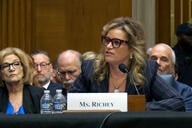You have /5 articles left.
Sign up for a free account or log in.
PHILADELPHIA -- John K. DiPaolo is a brave man.
College lawyers are far from thrilled with how DiPaolo's employer -- the U.S. Education Department's Office for Civil Rights -- is regulating colleges' handling of sexual harassment of students is an understatement.
Yet there DiPaolo was Thursday before a roomful of legal experts at the annual meeting of the National Association of College and University Attorneys, explaining the department's recent actions and absorbing pointed yet generally polite pushback from those who believe the agency has overstepped its bounds in cracking down on perceived violations of Title IX of the Education Amendments of 1972. (It could be argued that DiPaolo was there under false pretenses, given that the session's moderator, David A. Armstrong, of Notre Dame College of Ohio, joked that he had lured the federal official to the meeting by assuring him that "he would be among friends.")
The Obama administration has stepped up its enforcement of sexual harassment rules since 2010, starting with investigations that led to voluntary resolution agreements with Armstrong's institution and Eastern Michigan University, escalating with high-profile inquiries at Yale University and the University of Notre Dame and a 2012 letter with regulatory guidance, and peaking this spring with a settlement with the University of Montana. The Montana case drew significant attention because, in a letter trumpeting the expansive and unusually aggressive agreement, the Justice Department characterized the settlement there as a "blueprint" for other colleges.
Among other things, the Montana agreement drew fire from civil liberties' advocates for appearing to define sexual harassment exceptionally broadly to include some statements, and from many campus officials for, among other things, seeming to reject Montana's policy of requiring that sexual harassment be "objectively offensive," opening up the possibility of a much more subjective definition, said Armstrong, currently vice president for enrollment and legal counsel at Notre Dame but about to become president of Thomas More College.
Before DiPaolo, the Education Department's deputy assistant secretary for policy at OCR, addressed the campus lawyers, they heard tales of woe from two institutions that had been in the OCR's sights recently. Caroline G. Hendel, senior associate general counsel at Yale, and Joseph H. Feldhaus, general counsel at Ohio's Xavier University, described their experiences in detail.
Among the highlights (or lowlights, depending on one's perspective): Hendel noted that because of the government's concerns about protecting the privacy of the students who complained about harassment at Yale, the university has never, more than two years since the case was brought, seen a copy of the students' complaint, even though reporters aplenty had it. (Xavier eventually did get a copy of the complaint it was being asked to respond to, Feldhaus said, but it was redacted so heavily that "you wouldn’t know if it was somebody’s grocery list or a legal document.")
Feldhaus also warned his counterparts at other institutions that if a harassment claim is brought against them, the allegations in complaints "became truth" as soon as they were reported, no matter how incorrect they later proved to be, and that Xavier officials had opted to "take the body blows" rather than take the risk that responding to the students' complaints might violate federal privacy laws.
With those cautionary tales setting the stage for him, DiPaolo did his best to reassure the assembled lawyers that despite what they might have heard, OCR has not sought to alter federal sex harassment laws and policies in the Montana or other recent agreements. First of all, he said, the Montana letter described the settlement there as "a blueprint for other colleges, not the blueprint" -- a distinction unlikely to satisfy many of them.
More importantly, he continued, echoing a statement the agency made last month amid the post-Montana frenzy generated by civil liberties advocates, resolution agreements for individual campuses are specific to the issues and problems at those institutions, and apply only to those places. "No resolution agreement represents OCR policy," he said. "Policies are what we issue in 'Dear Colleague' letters."
And to the extent that college officials read the Montana agreement to say that OCR was altering the definition of sexual harassment to include things that were something less than "objectively offensive," he insisted that the agency remains faithful to legislative language that defines sexual harassment or other misconduct under Title IX as something that "limits or denies a student's ability to benefit from their educational program."
"Whether it's severe or pervasive or objectively offensive isn't really what matters," he said. "The Title IX standard is that there has been unwelcome sexual conduct that is sufficiently serious that it limits or denies the student’s ability to benefit from the educational program."
During the question-and-answer period, those in attendance raised several other issues, expressing varying degrees of agitation. Several officials said they were troubled by an OCR standard that appears to grant broad confidentiality protection to student victims who bring possible harassment violations to their institutions' attention, but then say they do not want the colleges to investigate them. That can institutions in a jam, especially in states, like Ohio, where campus officials can themselves be charged with a crime if they don't report potential criminal behavior to the police, some in the audience said.
Another college lawyer drew significant applause from his colleagues when he challenged DiPaolo to "commit" that if the Education Department seeks to make significant changes to Title IX in the future, it will do so through the normal (and more democratic) process of negotiated rule making rather than through more "Dear Colleague" letters. DiPaolo's good-humored response: "I will take that as a suggestion, not merely a question, and take it under advisement."
For all their criticisms -- and there were plenty -- the lawyers made it clear that on balance, they understand what DiPaolo and OCR are trying to do, and share the same goals. Yale's Hendel noted that the university and the civil rights office "were successful in coming to a resolution," and that as the groups of officials worked together, they "very quickly became less adversarial and more cooperative." And Feldhaus of Xavier said that "over all, our campus and university came out better from all of this."
The government and college leaders share a goal of making campuses safe and welcoming for students, DiPaolo said. "That's why we're all here."





